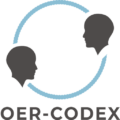Welcome to an online collaborative learning-based course “Digital resources”!
Authors: Giedre Tamoliūnė, Aušra Rutkienė, Indrė Oleškevičienė, Vytautas Magnus University, Lithuania

The course “Digital resources” is for higher education teachers who are novices in the topic of Open Educational Resources (OER) but want to gain knowledge and skills in identifying, creating, sharing OERs, and recognizing/copyrighting them.
Training material follows the DigCompEdu framework Area 2 – Digital Resources elements, aiming to qualify higher education (further-HE) teachers as integrators who can enhance diverse teaching practices with online collaborative learning methods in the context of blended learning engagement in higher education.

COURSE-SPECIFIC OBJECTIVES
- introduce the value of OER to support teaching and learning.
- Introduce different search strategies for selecting openly licensed educational resources.
- explain the principles of the assessment of the quality of a particular OER.
- enhance teachers’ digital competence to produce OERs by introducing the five main steps of the OER production process.
- discuss and explain the fundamental role of copyright and open licensing principles.
- empower teachers to assign Creative Commons licenses to self-created or collaborative resources by describing the four different Creative Commons License components and six licenses.
Course structure
The course consists of three lessons. Each lesson covers theoretical material presented in textual or video format, a concise summary of theoretical material presented in PowerPoint slides, a self-assessment quiz, and further reading materials to deepen your knowledge.
A more detailed course structure is presented in Fig. 1 below. Please note that it is optional to take the whole course; you can study any lesson based on your prior knowledge of this topic.

Fig. 1. Structure of the course “Digital Resources”
Disclaimer: The European Commission’s support for the production of this training material does not constitute an endorsement of the contents, which reflect the views only of the authors, and the Commission cannot be held responsible for any use that may be made of the information contained therein.
- Check David Wiley’s blog “On quality and OER” (2013) where he addresses the core questions of OER quality.
- Read the paper “Questions of quality in repositories of open educational resources: a literature review” by Atenas and Havemann, 2014 (last updated 02 Aug 2023).
- Audit the Module 4 “How can I determine the Quality and value of OER” as part of the course “ as part of the “OER Implementation Collection Modules” and check the recommended evaluation rubrics for evaluating OER to have a wider and more critical understanding of the topic.
- Check “Rubrics for evaluating Open Education Resources (OER) objects” by Achieve is licensed under a Creative Commons Attribution 3.0 Unported License
- Study “How to account for the accessibility of OER” by Open Science (2022).
